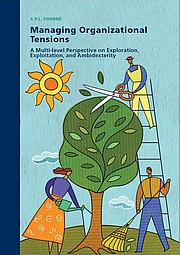Managing Organizational Tensions: A Multi-level Perspective on Exploration, Exploitation, and Ambidexterity Defended on Thursday, 18 September 2014
This dissertation draws on organizational learning and paradox theory to develop fine-grained insights at the individual, unit, and organizational level that contribute to the theoretical development of the exploration-exploitation framework. The four studies included in this dissertation reveal the nature of the tensions emerging in pursuit of ambidexterity at different levels and examine based on quantitative and qualitative data how organizations and their members can manage these tensions effectively in order to foster ambidextrous behaviors, to balance exploration and exploitation, and to be strategic, yet agile across emerging and established markets.
First, using meta-analytic techniques I assess which and how contingency factors influence the association of exploration and exploitation and clarify how conceptual choices and study context influence the generalizability and interpretations of primary studies in ambidexterity research. Second, at the individual level antecedents and outcomes of managers’ ambidextrous behaviors are uncovered and tested. This study indicates that tenure is a double-edge sword; organizational tenure increases managers’ ambidextrous behaviors, while functional tenure undermines such behaviors. Managers’ ambidexterity is particularly valuable when work contexts are characterized by uncertainty and interdependence. Third, I put forward a multi-actor model investigating middle managers’ personal interactions with their peers in other business units and top managers in relation to unit ambidexterity. This study uncovers complementarities and trade-offs among middle managers’ horizontal and vertical interpersonal processes. Fourth, at the organizational level I delve into the foundations and drivers of strategic agility and into how the inherent tensions can be managed in a multi-market context.
Keywords
Exploration, exploitation, ambidexterity, organizational learning, paradox theory, tensions, middle managers, interpersonal processes, strategic agility, emerging markets, MNEs, dynamic capabilities, multi-level, meta-analysis












